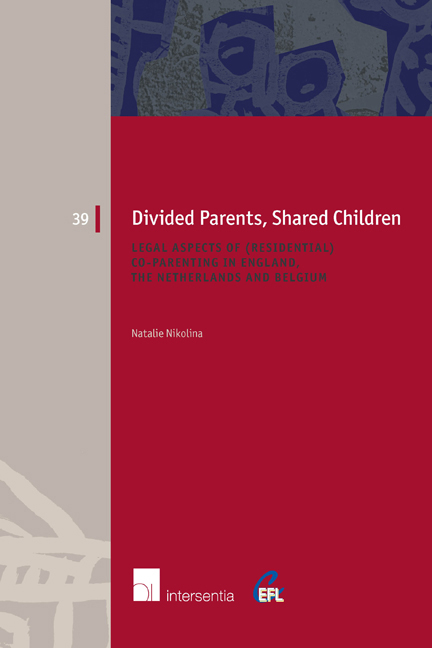 Divided Parents, Shared Children
Divided Parents, Shared Children Book contents
- Frontmatter
- Acknowledgements
- Contents
- Chapter 1 Introduction
- Chapter 2 International and European framework
- Chapter 3 The English legal system
- Chapter 4 The Dutch legal system
- Chapter 5 The Belgian legal system
- Chapter 6 Socio-psychological aspects of residential co-parenting
- Chapter 7 Comparative synthesis
- Chapter 8 Conclusions and recommendations
- References
- Samenvatting
- About the author
- European Family Law Series
Chapter 4 - The Dutch legal system
Published online by Cambridge University Press: 12 December 2017
- Frontmatter
- Acknowledgements
- Contents
- Chapter 1 Introduction
- Chapter 2 International and European framework
- Chapter 3 The English legal system
- Chapter 4 The Dutch legal system
- Chapter 5 The Belgian legal system
- Chapter 6 Socio-psychological aspects of residential co-parenting
- Chapter 7 Comparative synthesis
- Chapter 8 Conclusions and recommendations
- References
- Samenvatting
- About the author
- European Family Law Series
Summary
HISTORY OF THE MAIN LEGAL AND SOCIETAL DEVELOPMENTS
The law tends to follow societal changes, especially in the field of family law, but does that with a certain delay. Over the years both society's views on what parenthood entails, as well as the practicalities of parenting have changed significantly.
When it comes to the post-separation provisions on parental responsibilities and residence in the Netherlands, the main legal changes have been realized in the last two decades. However, it was as early as 1984 when the highest Dutch court (Hoge Raad) allowed two parents to continue the joint exercise of parental responsibilities after divorce.
1984 CASE LAW
Back then the rule existed that after divorce one of the parents, in practice usually the mother, would be given parental authority (gezag) over the child. In the 1984 decision, the Hoge Raad considered that this legal provision entailed an interference with the right to respect for private and family life, as contained in Article 8 of the ECHR. Such interference can be justified if the best interests of the child would suffer because he or she would be exposed to the conflicts between the parents generated by the relationship breakdown. In the case at hand, the opposite was true: the parents both wanted to continue exercising parental authority jointly after divorce and said that they were able to do that in co-operation and harmony. The parents lived near each other and the child resided alternatively with both parents. In such a case the court needed to evaluate whether the termination of joint parental authority would indeed be necessary to protect the best interests of the child.
In two subsequent decisions in 1986, the Hoge Raad elaborated on joint parental authority after separation and laid down certain conditions. In the first case the parents were cohabiting and had never been married, while in the second the parents were divorced and the mother had been granted sole parental authority. The parents in both cases wanted to jointly hold and exercise parental authority over their child.
- Type
- Chapter
- Information
- Divided Parents, Shared ChildrenLegal Aspects of (Residential) Co-Parenting in England, the Netherlands and Belgium, pp. 81 - 118Publisher: IntersentiaPrint publication year: 2015
